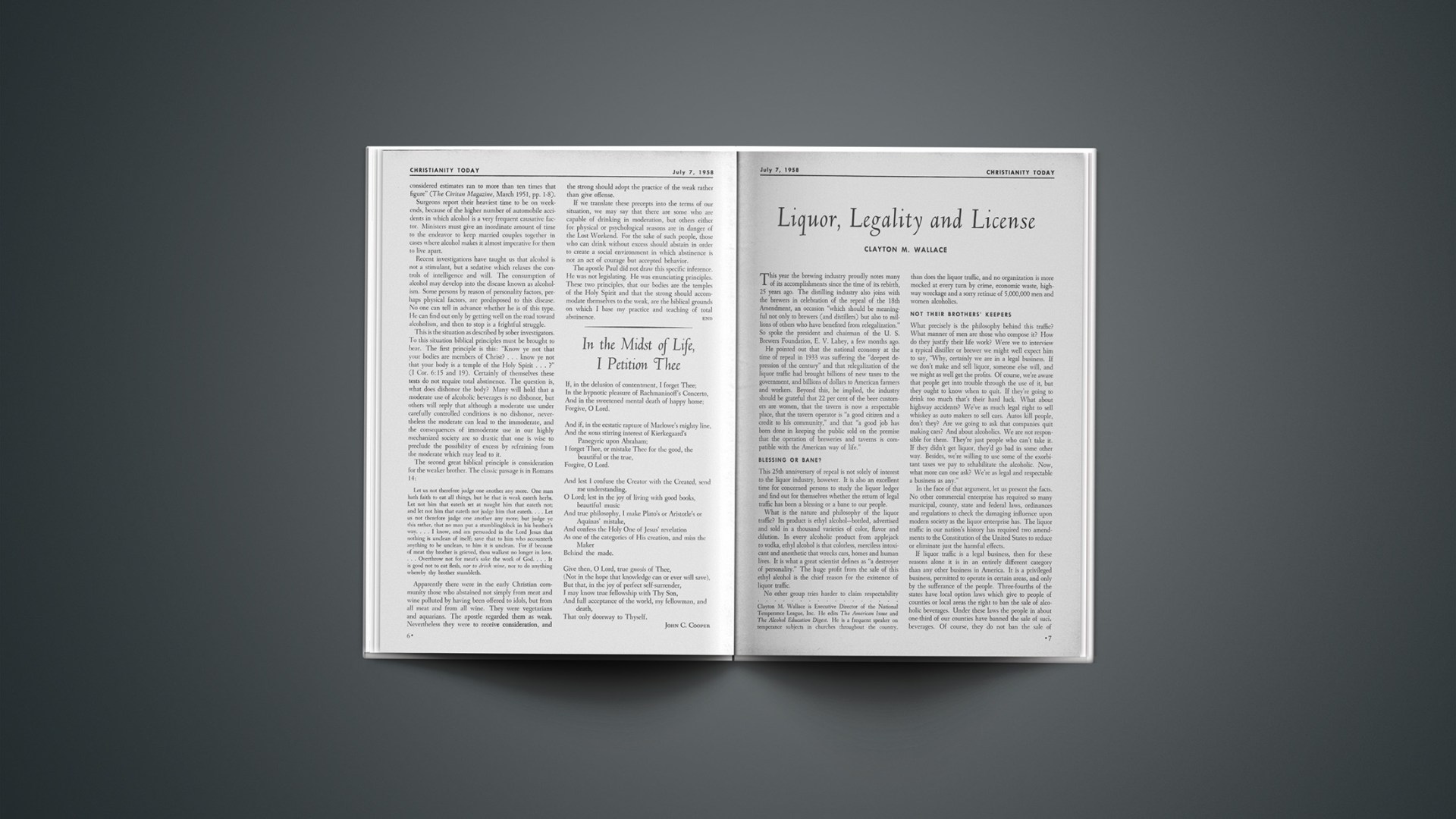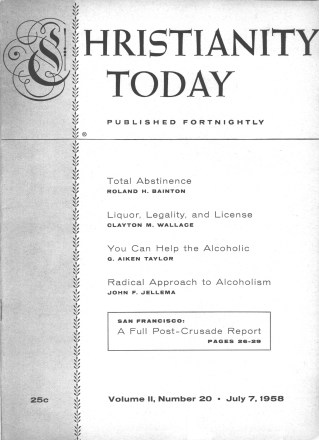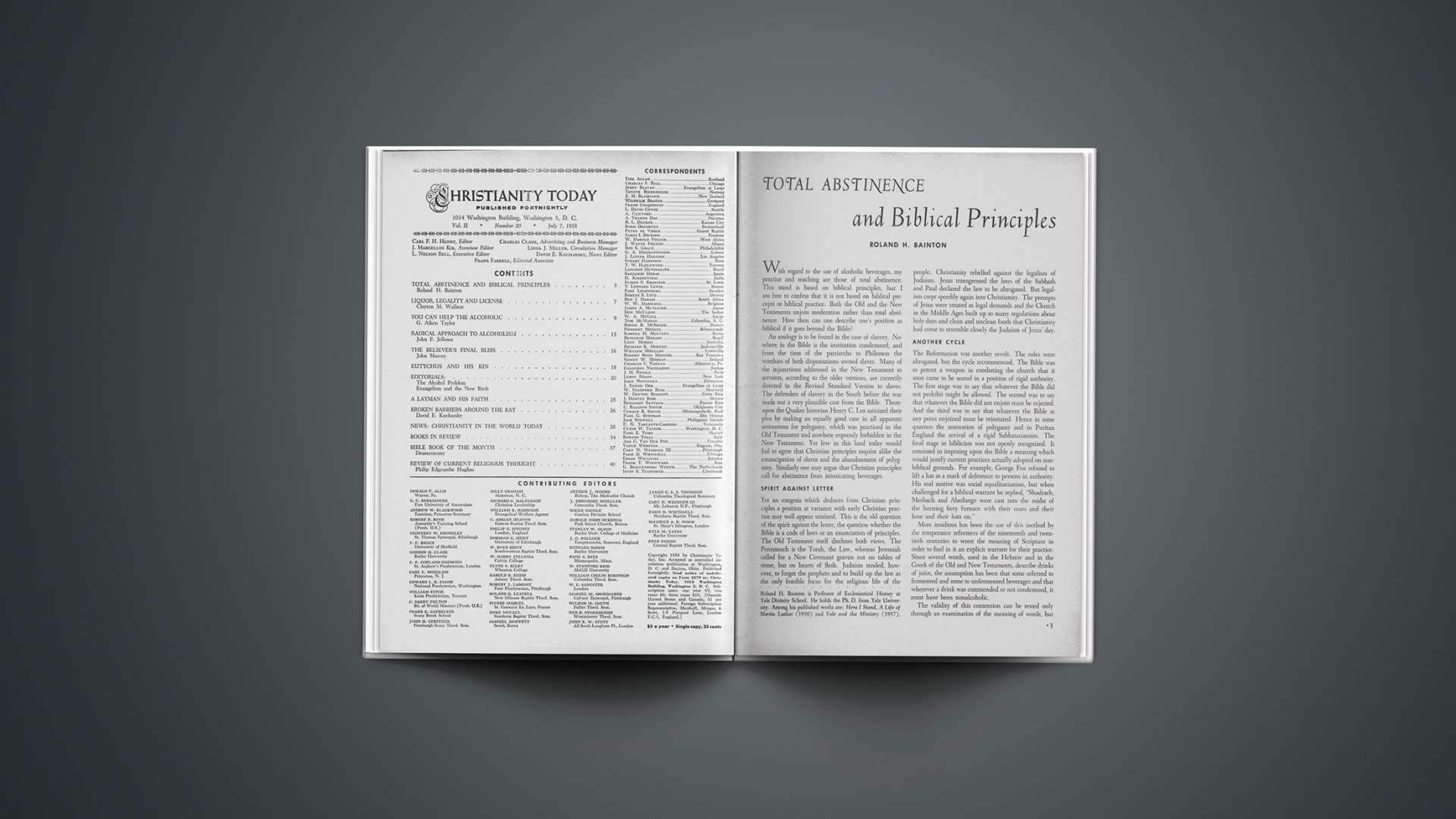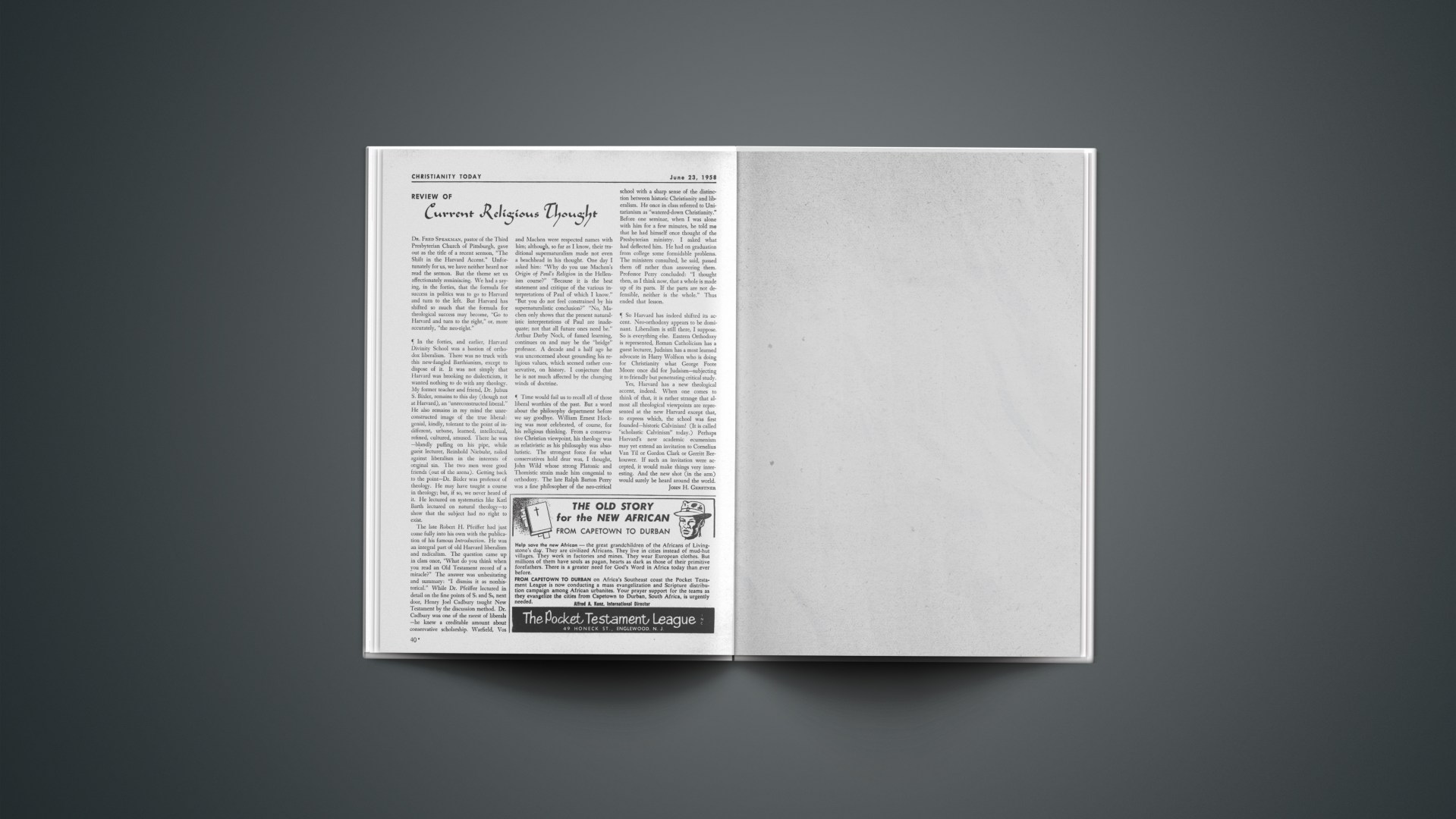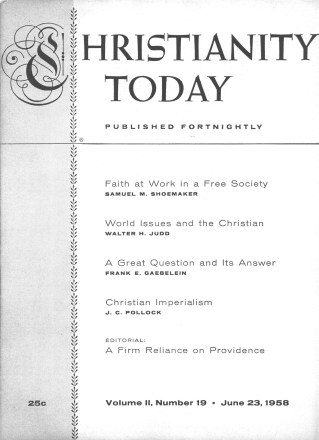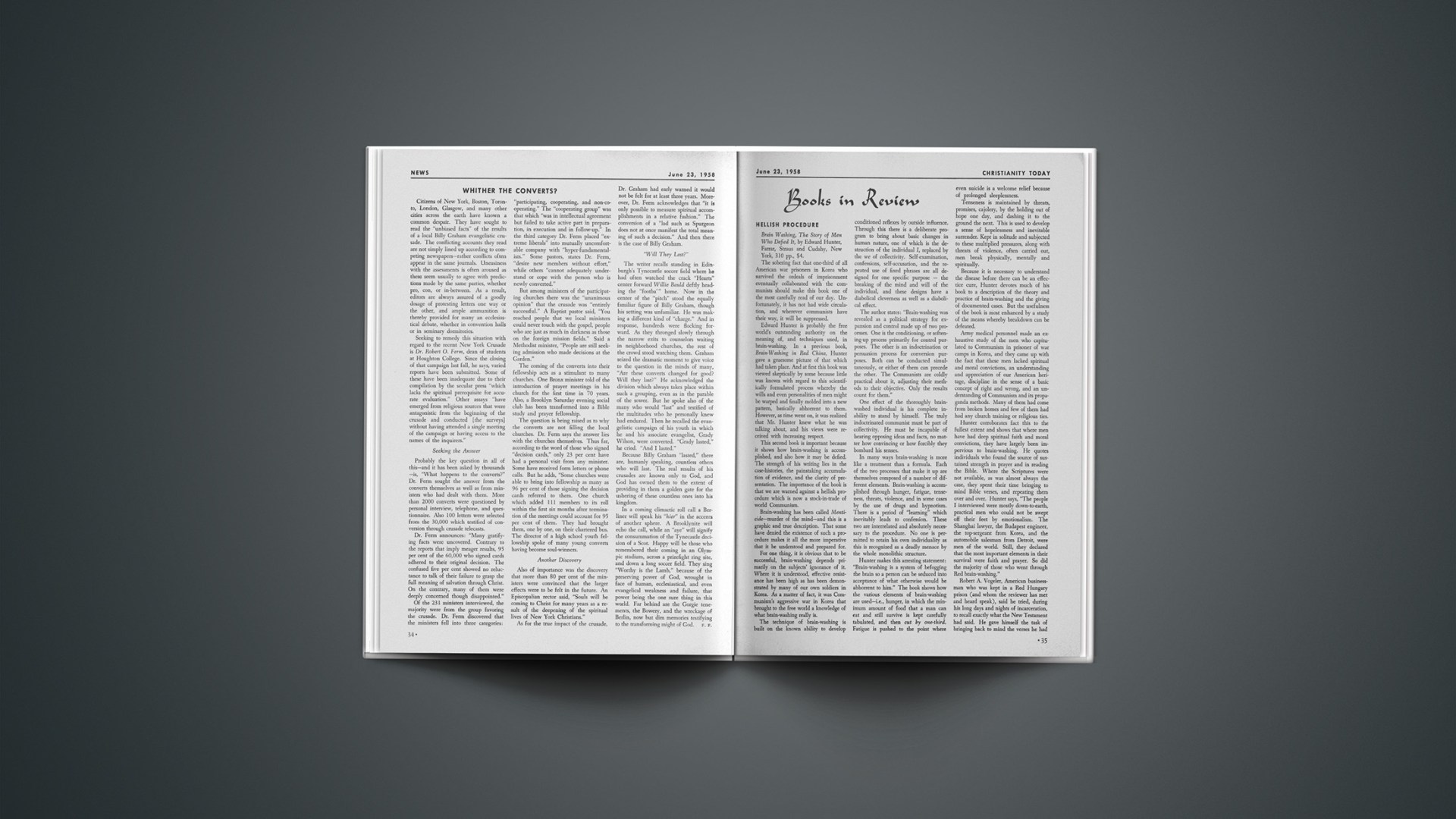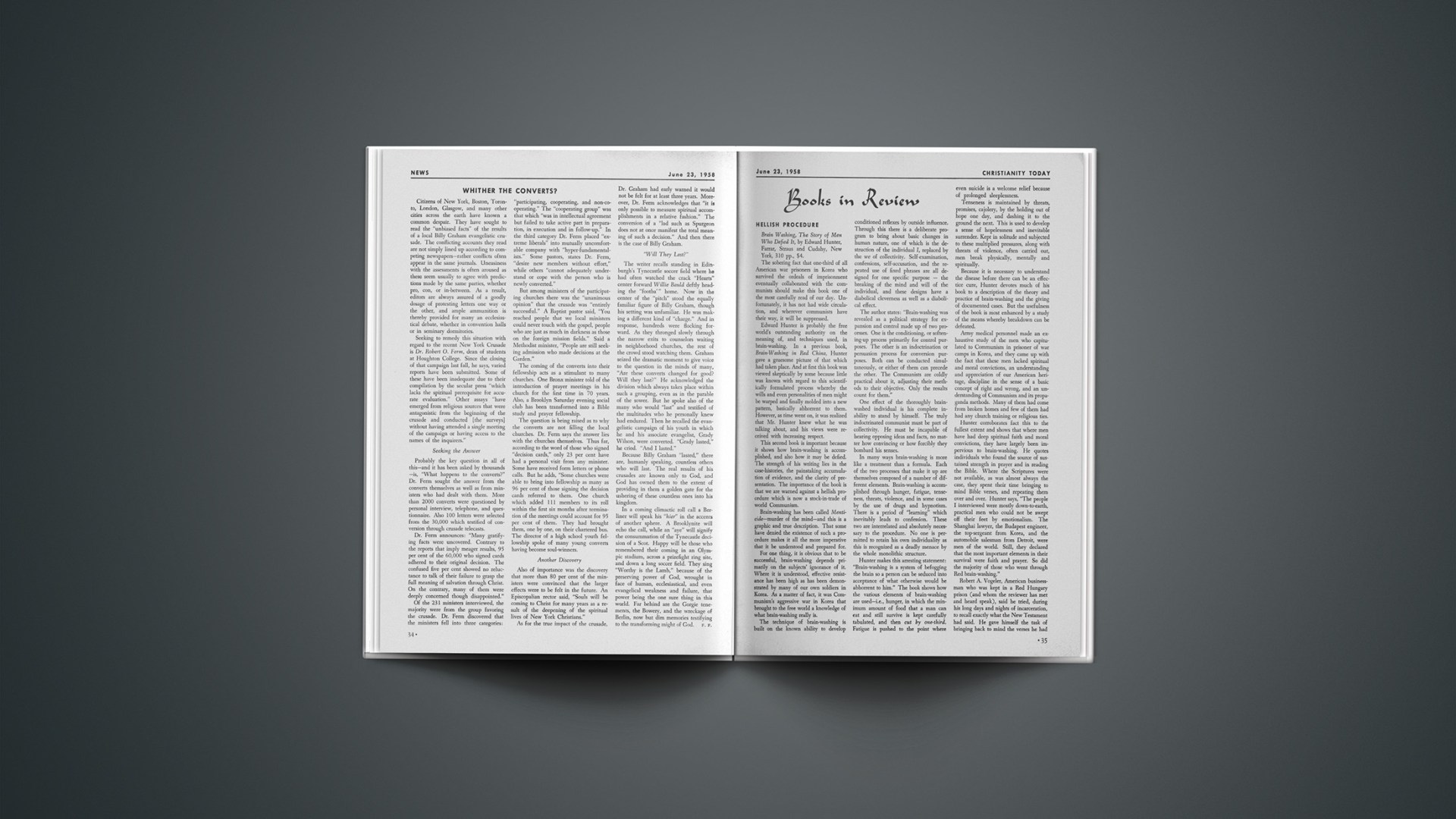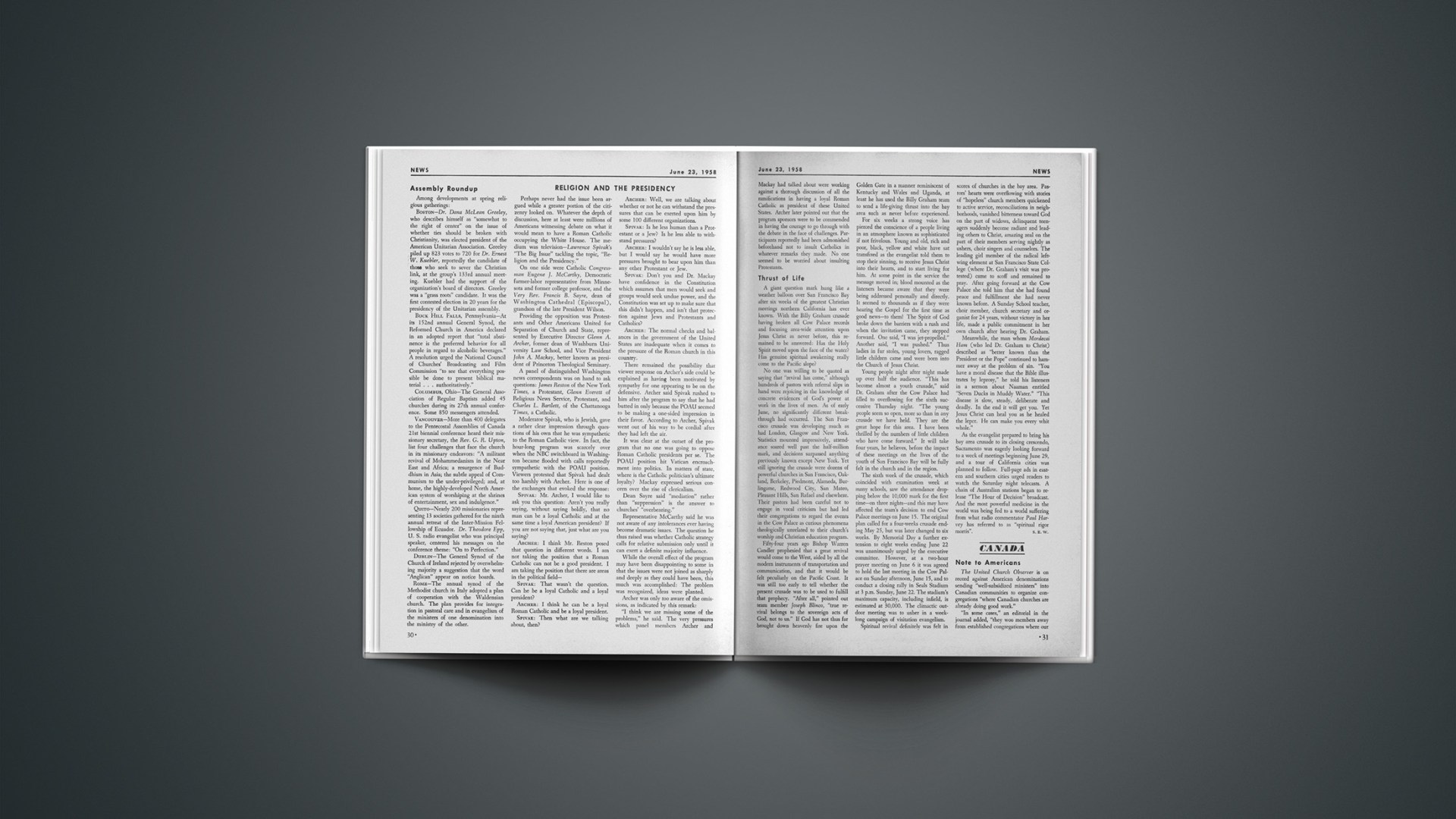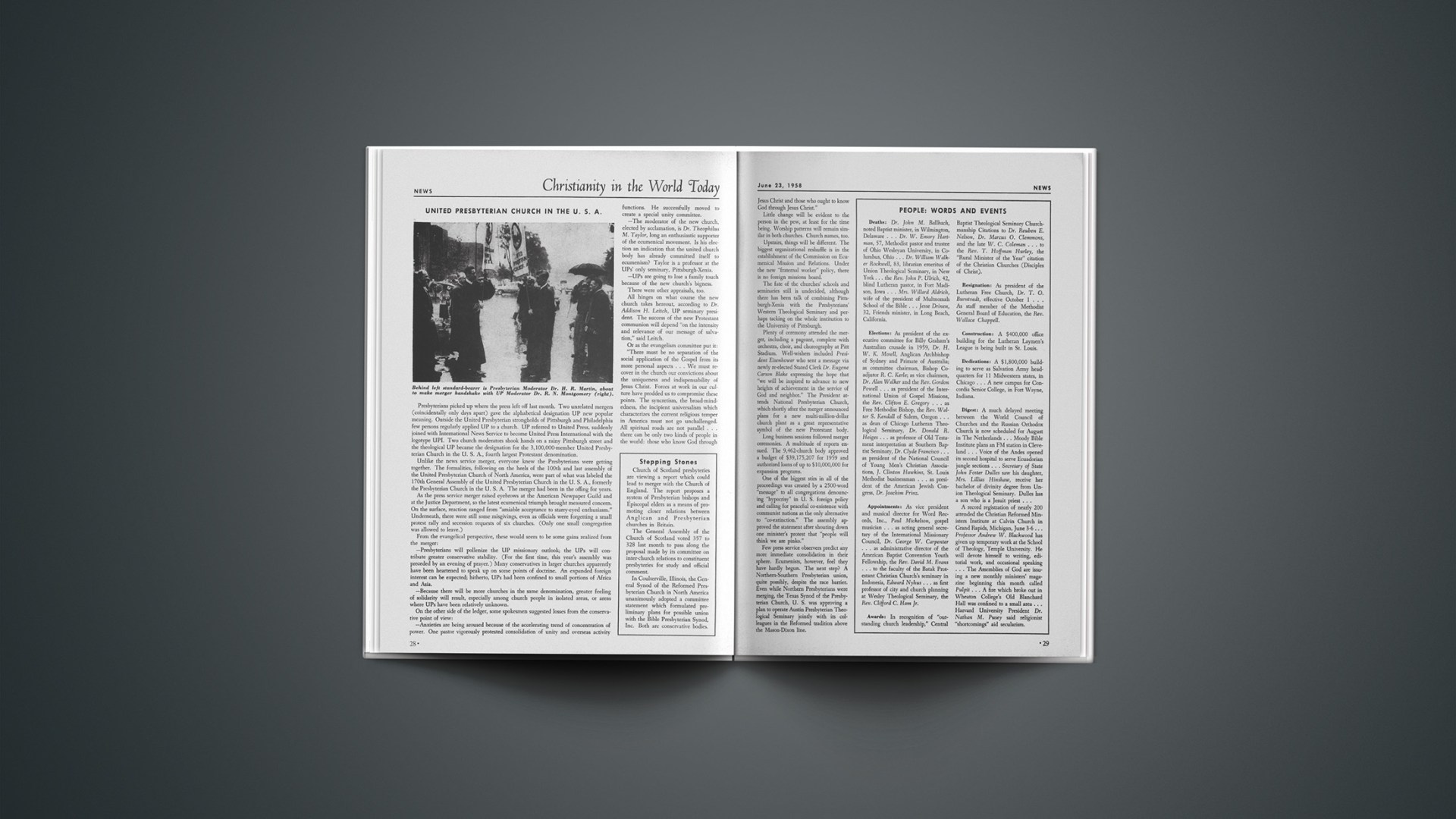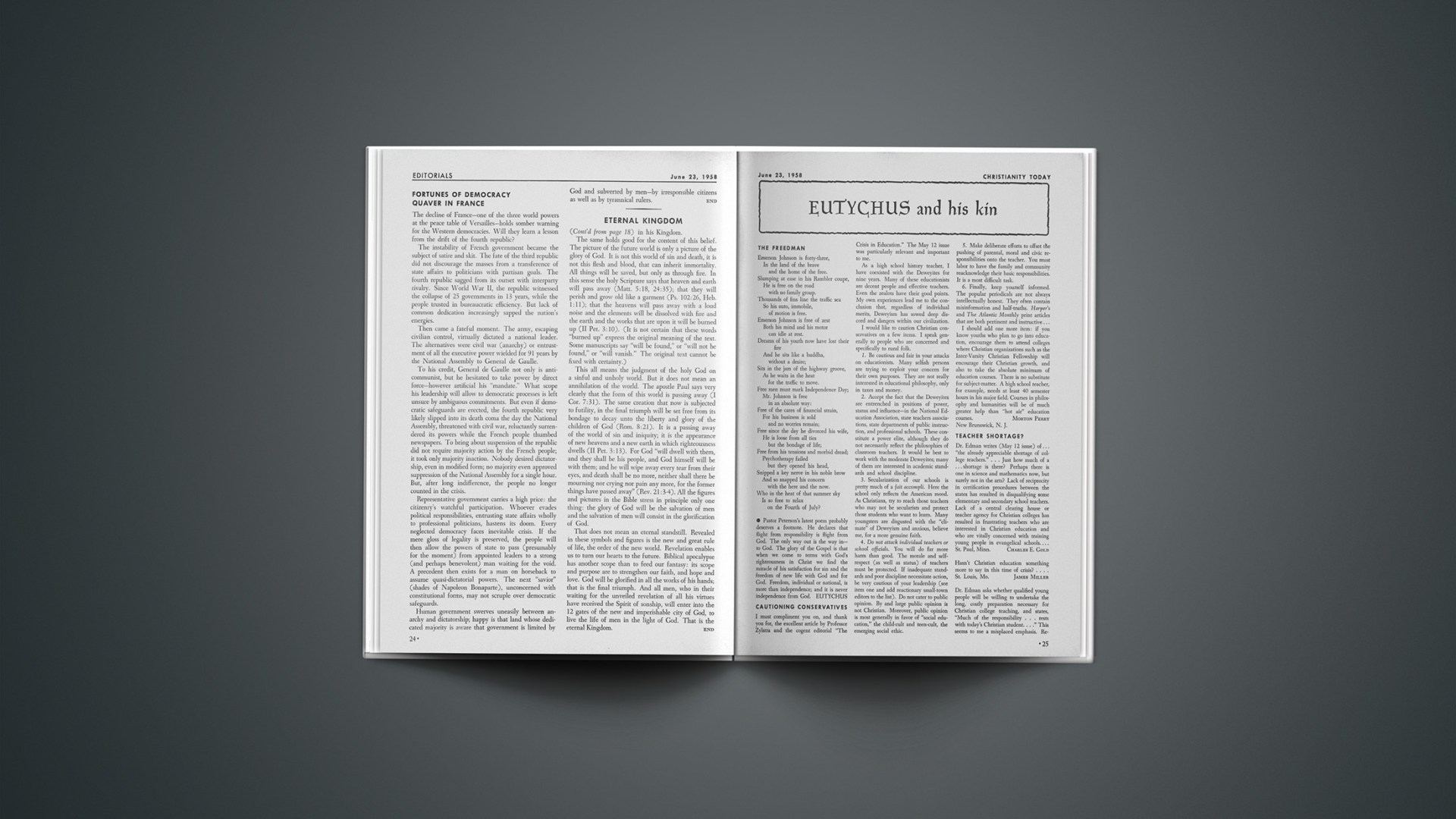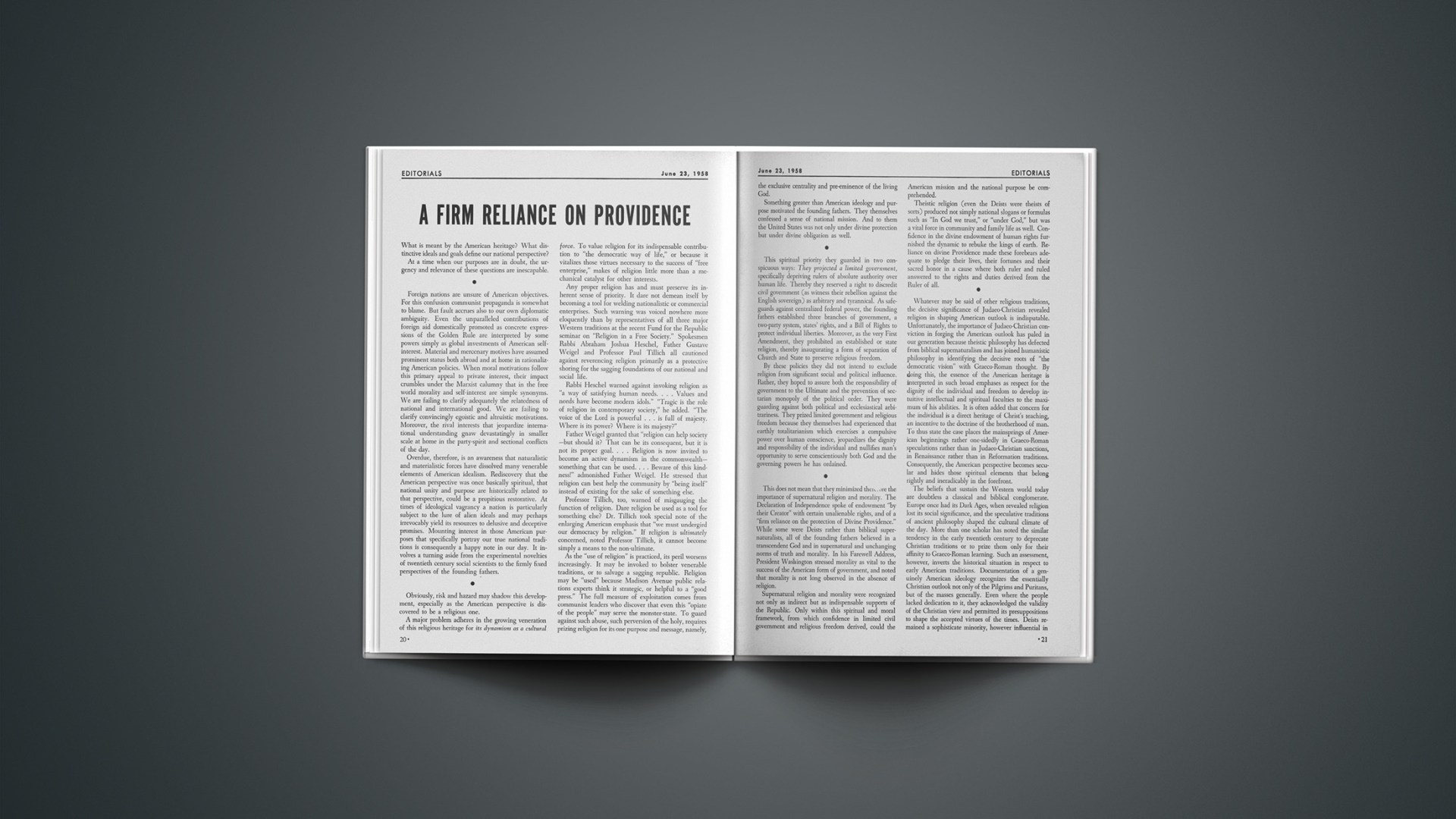This year the brewing industry proudly notes many of its accomplishments since the time of its rebirth, 25 years ago. The distilling industry also joins with the brewers in celebration of the repeal of the 18th Amendment, an occasion “which should be meaningful not only to brewers (and distillers) but also to millions of others who have benefited from relegalization.” So spoke the president and chairman of the U. S. Brewers Foundation, E. V. Lahey, a few months ago.
He pointed out that the national economy at the time of repeal in 1933 was suffering the “deepest depression of the century” and that relegalization of the liquor traffic had brought billions of new taxes to the government, and billions of dollars to American farmers and workers. Beyond this, he implied, the industry should be grateful that 22 per cent of the beer customers are women, that the tavern is now a respectable place, that the tavern operator is “a good citizen and a credit to his community,” and that “a good job has been done in keeping the public sold on the premise that the operation of breweries and taverns is compatible with the American way of life.”
Blessing Or Bane?
This 25th anniversary of repeal is not solely of interest to the liquor industry, however. It is also an excellent time for concerned persons to study the liquor ledger and find out for themselves whether the return of legal traffic has been a blessing or a bane to our people.
What is the nature and philosophy of the liquor traffic? Its product is ethyl alcohol—bottled, advertised and sold in a thousand varieties of color, flavor and dilution. In every alcoholic product from applejack to vodka, ethyl alcohol is that colorless, merciless intoxicant and anesthetic that wrecks cars, homes and human lives. It is what a great scientist defines as “a destroyer of personality.” The huge profit from the sale of this ethyl alcohol is the chief reason for the existence of liquor traffic.
No other group tries harder to claim respectability than does the liquor traffic, and no organization is more mocked at every turn by crime, economic waste, highway wreckage and a sorry retinue of 5,000,000 men and women alcoholics.
Not Their Brothers’ Keepers
What precisely is the philosophy behind this traffic? What manner of men are those who compose it? How do they justify their life work? Were we to interview a typical distiller or brewer we might well expect him to say, “Why, certainly we are in a legal business. If we don’t make and sell liquor, someone else will, and we might as well get the profits. Of course, we’re aware that people get into trouble through the use of it, but they ought to know when to quit. If they’re going to drink too much that’s their hard luck. What about highway accidents? We’ve as much legal right to sell whiskey as auto makers to sell cars. Autos kill people, don’t they? Are we going to ask that companies quit making cars? And about alcoholics. We are not responsible for them. They’re just people who can’t take it. If they didn’t get liquor, they’d go bad in some other way. Besides, we’re willing to use some of the exorbitant taxes we pay to rehabilitate the alcoholic. Now, what more can one ask? We’re as legal and respectable a business as any.”
In the face of that argument, let us present the facts. No other commercial enterprise has required so many municipal, county, state and federal laws, ordinances and regulations to check the damaging influence upon modern society as the liquor enterprise has. The liquor traffic in our nation’s history has required two amendments to the Constitution of the United States to reduce or eliminate just the harmful effects.
If liquor traffic is a legal business, then for these reasons alone it is in an entirely different category than any other business in America. It is a privileged business, permitted to operate in certain areas, and only by the sufferance of the people. Three-fourths of the states have local option laws which give to people of counties or local areas the right to ban the sale of alcoholic beverages. Under these laws the people in about one-third of our counties have banned the sale of such beverages. Of course, they do not ban the sale of bread, shoes, automobiles or gasoline; these are essential and useful commodities. But alcoholic beverages are not only nonessential, they are dangerous; and that is why their sale may be banned by vote, and that is why the 21st Amendment allows the people of any state to deal with them as they see fit, including total prohibition if that is their desire.
Definite Liability
What about the revenue from these products? Is this not important? Certainly it is, but not as an asset. Liquor taxes are actually “liability” taxes. For every dollar they bring in to the government, from four to twelve dollars must be paid for police, jail, court, welfare and rehabilitation by the tax-paying public. An official study made by the commonwealth of Massachusetts 15 years ago showed an income of 13 million dollars to the state from liquor, with direct costs of drunkenness to the state, 61 million, or over 4 to 1. These figures did not include the indirect costs of absenteeism and economic losses.
Last year the American people spent over 10 billion dollars for alcoholic beverages. Let us assume that 5 billion of that were taxes, and the other 5 billion went for grain, labor, bottling, transportation and advertising. This 5 billion, of course, could better have been spent for wholesome products. Therefore, were we to add to that lost 5 billion another 20 billion (4×5 billion for taxes, representing cost of taking care of liquor damage based on Massachusetts figures), we would have a minimum liability of 25 billion dollars as against 5 billion brought in as revenue. In other words, we would spend $5 to collect $1 in taxes.
And then there are the broken Repeal promises—that the bootlegger would disappear, and that the saloon would be forever abolished. But bootlegging thrives today in wet states as well as dry, and in place of saloons there are close to half a million taverns, cocktail lounges, night clubs and liquor stores where ethyl alcohol is sold by bottle, barrel, can or glass.
No Moral Concern
What about the broken promises concerning advertising? Pierre S. Dupont, a staunch Repeal advocate, stated in 1931 that “advertising is one of the most fruitful means of increasing business and promoting sales. As it is the policy of this country to reduce sales of liquor, no advertising of any kind should be permitted to manufacturers or sellers.” Yet today, simply because it is now a legal business, the liquor traffic spends an estimated four hundred million in advertising for beer, wine, and other liquors. And because it apparently lacks any social or moral concern, it is advertising its wares as if they were safe, wholesome and beneficial. This is why the liquor traffic can be called a corrosive evil in modern society.
One of the great concerns of the church has been a ceaseless activity on the part of liquor people to recruit new patrons. As alcoholics and older customers die off, they must be replaced. The liquor traffic, therefore, though it protests its innocence, aims much of its advertising at young adults, and is influencing teen-agers as well.
Because of its inferiority complex due to the stigma and restrictions that have been connected with it, the industry works hard to throw an aura of respectability about itself. This effort extends all the way from local tavern owners’ participation in Community Chest and Red Cross drives to intimate contacts with officials high up in the United States government.
Much could be said about the close liaison of the liquor traffic with military and service installations, and alcoholic beverages at NCO and officers’ clubs. The U. S. Brewers Foundation representatives constantly contact top military men to make sure servicemen have ready access to alcoholic beverages.
The liquor industry cultivates the closest possible business relationships with officials of state liquor monopoly systems by playing up the revenue aspect. It promotes close ties with manufacturers of containers, transport systems and others that benefit from the trade, and to the extent that these businesses seek the patronage of the liquor industry, they themselves become part of the liquor traffic.
Particularly menacing is the corrosive influence of liquor traffic on the public press and broadcast media of the nation. It is well said that “there is a very sensitive nerve extending from the liquor advertising department to the editorial desk of our great metropolitan dailies.” Acceptance of liquor advertising generally brings with it a strong, wet editorial policy. Similar attitude is evident in radio and television. The hiring of popular TV stars like Arthur Godfrey by Schlitz, and George Gobel by Pabst, for instance, pays big dividends in slanting program content in favor of alcoholic consumption.
Furthermore, the liquor traffic is allowed to deduct from taxes all the ordinary and necessary expenses paid or incurred during its taxable year in carrying on its trade or business. This means that the 400 million dollars spent for liquor advertising and “beercasting” to persuade and encourage people to drink may be deducted by the liquor traffic as a legitimate business expense. But persons who contribute to temperance organizations which seek constructive temperance legislation find that their gifts are nondeductible for income tax purposes.
In a case before the U. S. Supreme Court right now, the liquor traffic is seeking to get tax exemption for money spent by its constituency for advertising campaigns to block temperance legislation. If the Supreme Court rules in favor of the liquor traffic, the latter will then have a double advantage. Not only will liquor advertising expenses be deductible, but all money spent by the traffic to block regulatory or restrictive legislation at the national, state or local level will also be tax exempt. But persons contributing to national or state temperance organizations which engage in legislative or lobbying activities would still be unable to claim tax exemption on these gifts.
What can be done to protect society against the corrosive influence of such a danger?
First, there ought to exist rigid laws reducing the availability of alcoholic beverages. Local option laws in many areas ban the sale completely, and under the 21st Amendment, whole states may vote themselves dry whenever a majority of voters decide to do so.
Second, young people need to be convinced that abstinence is the safe and wise way, and the church needs to give to its members basic education on the effects of alcoholic consumption.
Society’s hope lies in pushing forward to the day when men engaged in the liquor traffic will be forced to remake their businesses into constructive industries producing wholesome and worthy products to the blessing and benefit of all men.
Clayton M. Wallace is Executive Director of the National Temperance League, Inc. He edits The American Issue and The Alcohol Education Digest. He is a frequent speaker on temperance subjects in churches throughout the country.

